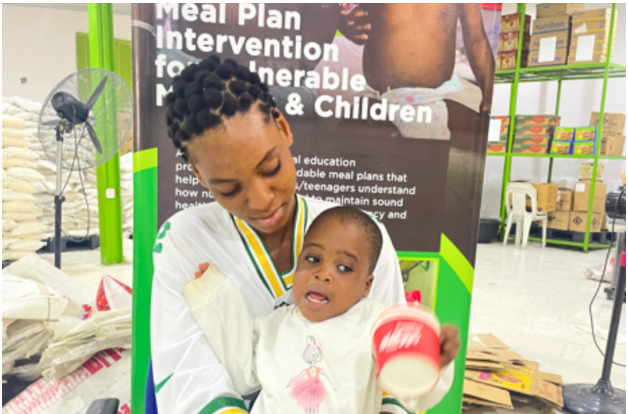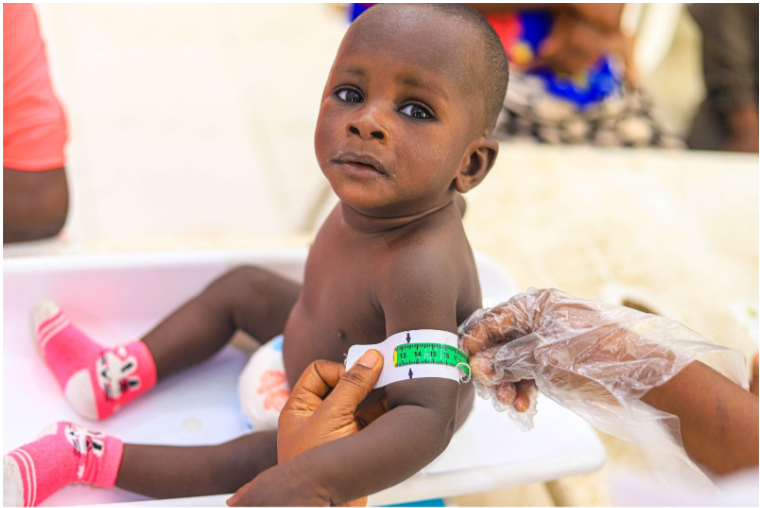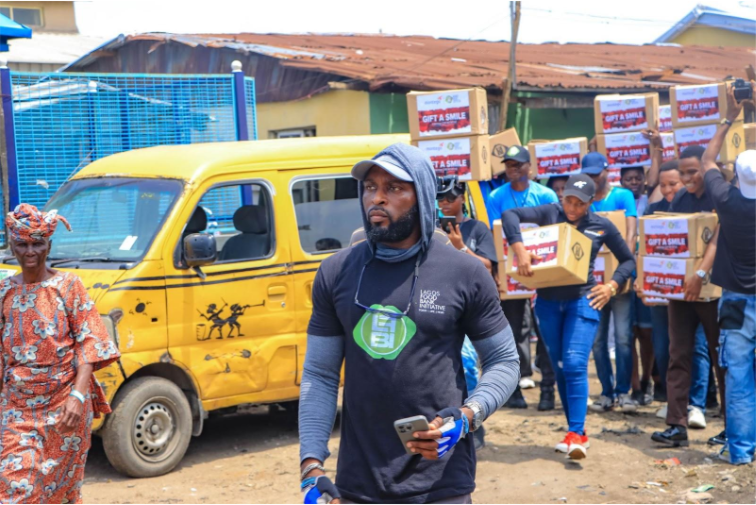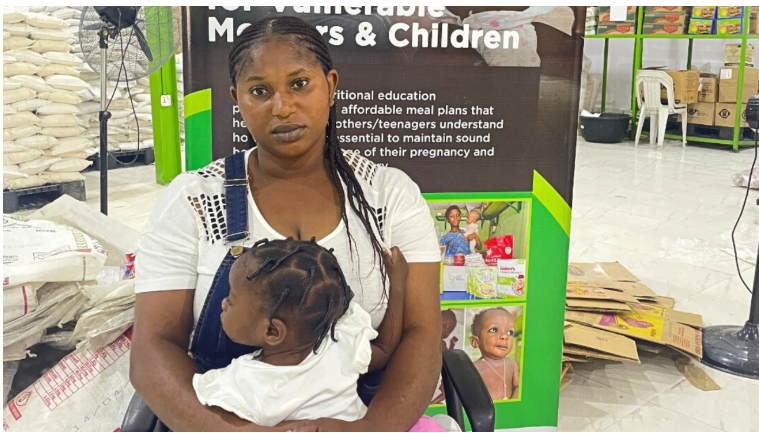Non-Governmental Initiatives Are Trying To Bridge the Malnutrition Gap in South West Nigeria
While malnutrition rates are notably high in Nigeria’s northern region, the South West faces its significant share of this public health crisis. Organisations like the Lagos Food Bank, through its NUMEPLAN Initiative, are trying to combat the problem.

When Azeezat Babatunde gave birth to her daughter, the baby was visibly underweight and lethargic. She was born prematurely. The 20-year-old single mother who lives in Alagbado, a densely populated area of Lagos, South West Nigeria, watched as her daughter was rushed to an incubator at the Lagos University Teaching Hospital (LUTH). Now three years old, the child’s earliest battles with malnutrition still echo through her mother’s memory.
Her skin was paper-thin, revealing the delicate network of veins beneath. Her ribs jutted out beneath a sunken chest that rose and fell in shallow yet rapid gasps.
According to Azeezat, the medical report from LUTH indicated that her daughter’s condition stemmed from poor maternal nutrition and inadequate prenatal care. The malnutrition had left the child’s muscles underdeveloped, and her movements were feeble.
Despite working long hours at a factory, Azeezat’s meagre earnings could barely cover her needs, let alone provide the balanced meals she and her child desperately needed. Her journey into motherhood was one overshadowed by financial hardships. With her parents’ insufficient income barely stretching to cover rent and utilities, nutritious meals were a luxury they couldn’t afford.
In those first days at LUTH, Azeezat’s daughter struggled to suckle. A nurse, recognising the danger, told her about the Lagos Food Bank, a non-profit organisation providing a lifeline to malnourished mothers and children.
Faced with her child’s severe condition, Azeezat did not hesitate.
“I was scared of losing my baby,” she said. Her child weighed barely 1.2 kilograms, less than half the global average for a healthy newborn, which the World Health Organisation places between 2.5 and 4.5 kilograms.
When she received her first nutritious pack, Azeezat recounts that it “felt like hope in a bag.” Within a few weeks of consistent support and dietary adjustments, her daughter’s health began to improve, as she recovered from the cruel imprint of malnutrition and premature birth etched across her tiny body.
“My baby’s weight increased to 5kg. She was energetic, and her cheeks gained a healthy glow,” she told HumAngle.
An escalating crisis
Azeezat’s daughter is one of over 5.4 million children in Nigeria at risk of acute malnutrition. This year alone, approximately 1.8 million children have faced severe acute malnutrition, according to Save the Children, an international humanitarian organisation.

Florence Uchendu, a nutritionist and the former FCT chapter president of the Nutrition Society of Nigeria, said malnutrition is a public health concern in the country, and the data on hunger, food insecurity, and malnutrition keeps soaring.
The nutritionist revealed that child food poverty has been identified mainly as the predisposing factor of malnutrition in children and has significantly contributed to “making them more susceptible to diseases.”
“Even though the government has instituted several committees on nutrition at the moment, without implementation, we will still be talking about this issue for some years to come,” she said.
In December 2023, the Nigerian government launched a “high-powered” Nutrition Core Working Committee. “We are determined to upturn the negative nutrition indices of this country,” said Vice President Kashim Shettima at the time. However, little has been heard about the committee’s work since its announcement. The federal government has also recently stated plans to review the National Policy on Food and Nutrition, nearly a decade after its introduction.
Yet, despite these policy-level efforts, the situation on the ground remains dire. In 2024, the United Nations Children’s Fund (UNICEF) reported that around 11 million children in Nigeria were experiencing severe child food poverty. That same year, the Federal Ministry of Budget and National Planning revealed that more than 31.8 million Nigerians were grappling with acute malnutrition, food insecurity, and the daily consequences of inadequate nutrition policy implementation.

The working strategy
While government efforts are yet to be felt in some communities, non-governmental organisations are stepping in to fill the gap. Based in Nigeria’s most populous city, the Lagos Food Bank Initiative is leading one such response. Since 2019, the organisation has run the Nutritious Meal Plan Intervention (NUMEPLAN), designed to bridge the country’s food and nutrition gap by tackling malnutrition among vulnerable mothers and children under five, beginning in Lagos. The programme offers weekly nutrient-dense meals, nutrition education, and regular health check-ups for mothers like Azeezat, who are striving to keep their children healthy amid growing hardship.

Since its inception eight years ago, with most of its activities concentrated in South West Nigeria, the group says it has treated over 3,000 lactating mothers and children.
Michael Sunbola, founder of the Lagos Food Bank Initiative, told HumAngle that NUMEPLAN operates by partnering with primary health care centres in underserved communities where malnutrition rates are particularly high.
“In Lagos, we are connected with about 300 health centres, and we are working with a lot of them. The PHC is the first point of call for the indigent mothers who can’t afford a standard health care system. When they go there, the health workers refer malnourished individuals to the programme, where they undergo nutritional assessments and receive tailored meal plans that can help the child and mother out from malnutrition.
“We initiated the NUMEPLAN programme by working with a group of nutritionists to help address the hunger gap and malnutrition scourge. A lot of families today find it difficult to make ends meet. Socioeconomic and dwindling disposable income and poverty are driving a lot of hunger,” he said
The sustainable food systems advocate emphasised that NUMEPLAN is not a one-off aid effort. Rather than just handing out food packages, the initiative integrates long-term solutions. After the nutrition intervention, vulnerable women are trained and empowered in agricultural activities, leading to financial stability through backyard farms established via the family farming programme.
“It is a consistent nutritious intervention for two to three months because of the solution we are trying to provide and the fact that most of these babies are malnourished, not because they have an underlying health condition, but because their parents can’t just afford to buy them nutritious and healthy food,” Sunbola said.
“During monitoring and evaluation, they come in biweekly for checkups so that we can track the progress,” he added. “Afterwards, we empower the mothers with sustainable skills that will ensure food security for themselves and their families.”
Empowering mothers, transforming communities
One key aspect of the initiative is its counselling sessions, which educate mothers on balanced diets and proper feeding practices. Mary Aduku, one of the programme’s beneficiaries, says she knows firsthand how useful the intervention can be.

Three months after she gave birth, her child’s health began to deteriorate. The baby’s weight dropped to 2kg. Alarmed by the baby’s thinness and weak cry, she rushed to a nearby primary health care centre, where the infant was diagnosed with acute malnutrition. It was there she heard about the food bank.
“After two weeks, my baby increased to 5.3 kg,” Mary told HumAngle. “Every two weeks, we receive milk, rice, and other nutritious food items. They also counselled me on how to feed my baby with a nutritious meal like egg custard, and they advised me on maintaining proper hygiene during and after the process.”
The programme’s holistic approach ensures that beneficiaries not only receive immediate relief but also acquire the knowledge and skills to sustain their health in the long term. Today, Azeezat’s and Mary’s children are thriving, and the women share their newfound knowledge with other mothers in their communities.
While malnutrition is most acute in Nigeria’s northern states, the southwest is far from immune. A study published by the International Journal of Community Medicine and Public Health revealed that acute malnutrition in children under five, as well as in pregnant and lactating mothers, remains a major concern in the region. Roughly 31 per cent of children there are underweight.
Dr. Uchendu believes that the strategy adopted by the Lagos Food Bank in addressing malnutrition in the southwest is commendable, but stressed that state and federal governments must key into such initiatives to expand their reach.
“Though it is a temporary way to ameliorate hunger and malnutrition among indigent mothers and children in the country, for the sustainability of such initiatives, the government at the state level should step down to reach more people battling with malnutrition in Nigeria,” she noted.
Facing an uphill battle
The Lagos Food Bank Initiative has some limitations.
One is the organisation’s slow adoption of digital tools to streamline operations. In an age where technology can greatly improve data tracking and feedback systems, the food bank still relies heavily on manual processes for monitoring and evaluation.
“In terms of technology, we are still working on that. It has not yet materialised,” the founder noted. “We are looking at a system where we can track the progress of the child from the baseline of malnutrition all through to success, which will rely on the support of the mother as well.”
Another pressing issue is mistrust among potential beneficiaries. Many indigent mothers find it hard to believe that the food and nutritional packages being offered are truly free. This mistrust, often rooted in past disappointments with aid programmes or fear of hidden costs, discourages many vulnerable families from participating or fully engaging with the initiative.
“Some of these mothers see the initiative as a scam when they’re being referred to us,” Sunbola told HumAngle. “There are situations where we had to visit their homes to convince them that the initiative is absolutely free before they visit our centre. I don’t blame them. We are in times where trust is scarce.”
While initiatives like NUMEPLAN are making a tangible difference, they also operate against the backdrop of a broader food security crisis in Nigeria.
The passage of the Right to Food Act in 2023 marked a significant step toward addressing food insecurity in the country. This legislation mandates the government to ensure access to adequate food for all Nigerians, laying the groundwork for more comprehensive interventions. The reality on the ground is far from addressing the persistent food insecurity, two years later.
In 2024, however, the Global Hunger Index ranked Nigeria 110th with a score of 28.8 out of the 127 countries with sufficient data to calculate last year’s global index. The data revealed that 18 per cent of Nigeria’s population is undernourished, with 31.5 per cent of its children stunted, while about 11 per cent of them die before their fifth birthday—largely due to inadequate nutrition and unhealthy environments.
The rise in malnutrition reflects a broader pattern of the intensifying humanitarian and systemic crises across Nigerian states. The drivers of this crisis are intertwined with broader challenges, including inflation, decreasing crop yields, persistent insecurity, and climate disasters that have disrupted livelihoods.
Rising food prices and inflation have continued to make it increasingly difficult for families to afford nutritious meals. The organisation’s website shows that the cost of essential supplies per pack is approximately ₦32,500 for children and ₦14,500 for mothers.
The funding constraints have equally contributed to threatening the sustainability of nutrition programmes, including that of the NUMEPLAN.
UNICEF has warned that due to funding shortfalls exacerbated by funding cuts from the US, vital supplies for malnourished children in Nigeria and Ethiopia could deplete within months.
Though the funding cut has not directly affected the NUMEPLAN initiative, as the programme is still ongoing, it has paved the way for tight competition between them and those affected.
“We are a privately driven entity with no foreign aid or support from the government,” said Sunbola. “However, those that are affected by the funding cuts are now competing with us to get funding from the corporate sector, where a large chunk of our funding comes from. So, it has become difficult to secure funding. But with the government’s support, we will not just impact thousands but millions of mothers and their children across Nigeria,” he emphasised.
For Dr Uchendu, “One way to solve this issue of food insecurity and malnutrition is to find a lasting solution to insecurity and support farmers to farm so that prices of food staples will drop for people to afford nutritious meals.”
Azeezat Babatunde's daughter was born prematurely and severely underweight due to poor maternal nutrition, highlighting a broader malnutrition crisis in Nigeria affecting millions of children.
Despite government efforts to address nutrition policy shortcomings, non-governmental initiatives like the Lagos Food Bank's NUMEPLAN provide essential intervention by offering nutrient-dense meals and educational support. Operating amidst financial challenges and limited resources, these programs aim to empower mothers with sustainable skills and knowledge. However, they face significant obstacles such as adoption of digital tools, customer mistrust, and funding limitations, further complicated by rising food prices and insecurity in Nigeria.
Support Our Journalism
There are millions of ordinary people affected by conflict in Africa whose stories are missing in the mainstream media. HumAngle is determined to tell those challenging and under-reported stories, hoping that the people impacted by these conflicts will find the safety and security they deserve.
To ensure that we continue to provide public service coverage, we have a small favour to ask you. We want you to be part of our journalistic endeavour by contributing a token to us.
Your donation will further promote a robust, free, and independent media.
Donate HereStay Closer To The Stories That Matter




